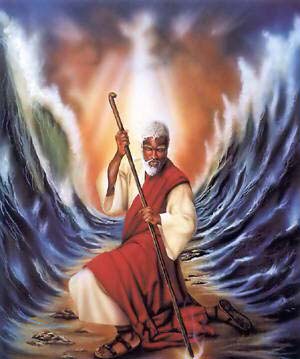The Phophets
Moses

The rapidly increasing population in Egypt caused much concern amongst the Egyptians, so the pharaoh ordered that all male children born to Hebrew women be slain at birth. A Levite woman, fearing for the life of her newborn son, hid him for three months, and when no longer able to do so, made a cradle out of bullrushes, wherein she laid her baby. She then placed the cradle by the banks of the river. While bathing, the pharaoh's daughter found the baby and feeling compassion, she decided to adopt him and called him Moses.
Moses grew up in the pharaoh' s household, but his loyalty to his own people was unshakable. One day, while out watching the Hebrews labouring for their Egyptian masters, he saw an Egyptian cruelly beating one of the Hebrews. Moses killed the Egyptian and buried his body in the sand, but the pharaoh heard of this and so Moses was forced to flee. He went to the land of Midian where he lived as a humble shepherd and married Zipporah, one of the priest's daughters. It was in this land, at the foot of a rugged, forbidding mountain, that the Lord spoke to Moses from a flame of fire out of the midst of a bush. Moses was commanded to lead the children of Israel out of their bondage in Egypt. He therefore, returned to Egypt where, joined by his brother, Aaron, they pleaded with the pharaoh to let their people go. But the pharaoh refused, and so God, to prove their divine purpose, manifested himself in many miraculous ways, and pharaoh finally relented.
They had not been gone very long, when pharaoh changed his mind and decided to pursue them, but God told Moses to stretch out his hand, which he did, and the waters of the Red Sea parted allowing the Israelites to cross over, after which, Moses caused the waters to return thus drowning the pursuing Egyptian armies.
Three months after their escape, they arrived at mount Sinai, and it was here, on the slopes of the mountain where Moses went to meditate, that God gave to him the ten commandments which were inscribed on two tablets of stone, and which tenets of the faith have been followed ever since by the children of Israel. According to the Lord's instructions, Moses and the people built an Ark of the Covenant made of acacia wood and overlaid with gold, containing the two tablets of stone. They carried this Ark with them on their journey.
Moses and the children of Israel wandered for forty years in the wilderness before settling in the Promised Land. Moses, now old in years, but not in spirit and ability, was not to enter this land himself.
After giving his people final instructions which make up the major part of the book of Deuteronomy found in the Old Testament of the Bible, Moses gave them his final blessing, made his way to the summit of a mountain about ten miles east of the mouth of the Jordan, and with his eyes gazing at the panoramic view of the land of Israel, this great prophet and servant of God, died.
Moses is known in the history of Israel as the law-giver and as an ideal and faithful leader.
Parsvanatha
Parsva is regarded as an incarnation of Indra. He was the son of King Visvasena of Kashi, a descendant of the Ikshvaku family, and Queen Bama Devi, daughter of King Mahipala. He was the twenty-third Tirthankara. He was born on the eleventh day of the dark fortnight in the month of Pousha in the year 872 B.C.
Parsvanatha began to practise the twelve vows of a householder when he was only eight years old.
Prince Parsva was now sixteen years old. He was sitting on the throne. His father Visvasena said, "My son, in order to continue our celebrated royal dynasty, you must marry now. At the desire of Nabhi Raja, Rishabha had to marry".
Parsvanatha was very much frightened when he heard the words of his father. He said, "My life-period will not be so extensive as that of Rishabha. I am to live only a few score years. I have already wasted sixteen years in boyish sports. I must enter the order in my thirtieth year. Should I then have a married life for so short a period in the hope of getting pleasures which are, after all, only imperfect, transient and illusory?"
Parsvanatha�fs heart was filled with a spirit of renunciation. He reflected within himself: "For long, long years I enjoyed the status of Indra and yet the lust for pleasures did not decrease. Enjoyment of pleasures only increases the lust for pleasures, just as the addition of fuel only increases the virulence of fire. Pleasures at the time of enjoyment are pleasant, but their consequences are surely disastrous.
"The soul experiences from beginningless time the sufferings of birth, old age, etc., on account of its attachment to the objects of this world. To satisfy the cravings of his senses, man wanders in the realm of pain. So that he may have sensual gratification, he does not heed the moral injunctions and he commits the worst vices. He kills living animals to enjoy the pleasures of the senses. Lust is at the root of theft, greed, adultery and all vices and crimes.
"As a consequence of sinful acts, the soul is forced to migrate from birth to birth in the kingdom of the lower animals etc., and to suffer the torments of hell. This lust for pleasures must be shunned ruthlessly. So long I have wasted my life. I am not going to spend any more time in the vain pursuit of pleasures. I shall be serious and practise right conduct."
Prince Parsva had the twelve Anuprekshas or meditations. He resolved to abandon the world. He took leave of his parents and then left his house. He retired into the forest. He became absolutely naked. He turned towards the north and bowed to the great Emancipated Siddhas. He plucked five tufts of hair from his head and became a monk.
Parsva practised fasting. He observed with scrupulous care the twenty-eight primary and the ninety-four secondary rules of the order of monks. He was found lost in meditation. He attained the pure omniscience. He attained the final liberation in the Sammeda Hill which is known today as the Parsvanatha Hill.
Parsvanatha preached in Kashi, Kosi, Kosala, Panchala, Maharashtra, Magadha, Avanti, Malava, Anga and Vanga. Many joined the Jain faith. Parsvanatha spent seventy years in preaching.
Mahavira modified and enlarged what had already been taught by Parsvanatha. He did not preach anything which was absolutely new.
Parsvanatha lived for one hundred years. He abandoned his home when he was thirty years old. He left home in 842 B.C. and attained Nirvana in 772 B.C.
Glory to Parsvanatha, the twenty-third Tirthankara!
Buddha

Click Here.




